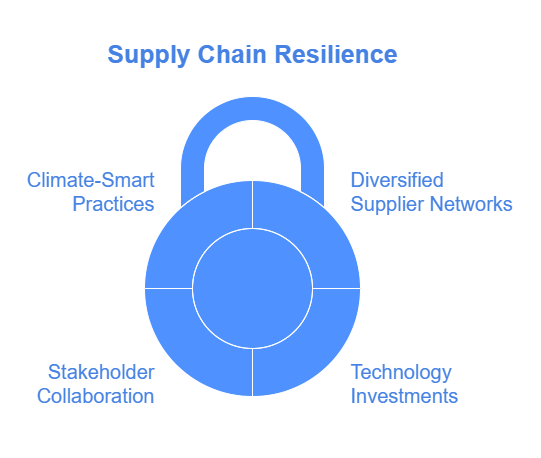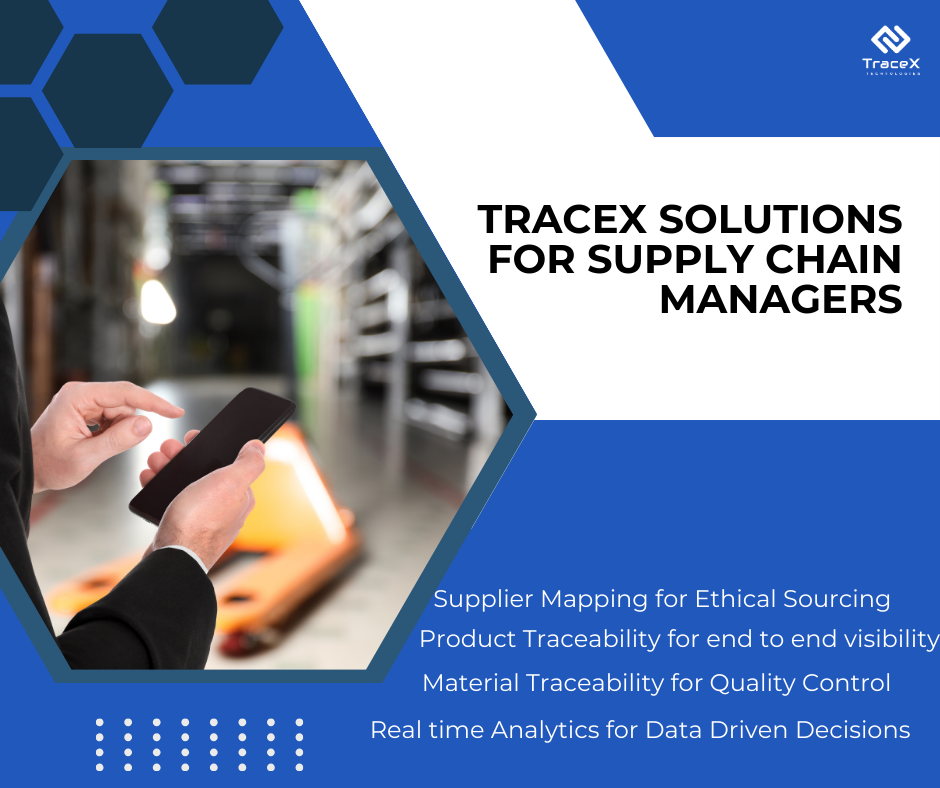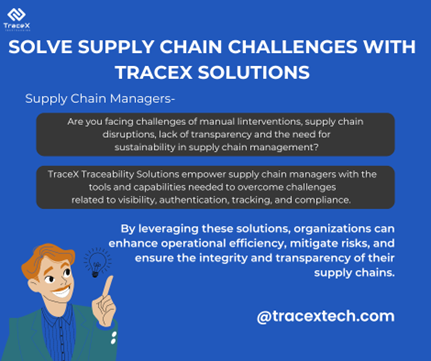Contact: +91 99725 24322 |
Menu
Menu
Quick summary: Empower your supply chain management journey with TraceX solutions! Dive into our blog to discover how innovative technology is revolutionizing the way managers navigate challenges, enhance transparency, and optimize operations for unparalleled efficiency and success.

Managing supply chains in agribusiness is like navigating a complex web of interconnected processes, often stretched across global boundaries. In the world of agribusiness supply chain management, the stakes are even higher. From fragmented supply chains to unpredictable climate impacts, inefficiencies don’t just dent profits—they jeopardize the livelihoods of farmers and disrupt global food security.
Did you know that over 40% of supply chain managers cite limited visibility as their biggest operational challenge?
Traditional methods simply can’t keep up with the growing demands for transparency, sustainability, and regulatory compliance. The good news? By leveraging innovative solutions, agribusinesses can overcome these hurdles and pave the way for resilient and future-proof supply chains. Read on to explore how.
Key Takeaways
Agribusiness supply chain management refers to the coordinated planning, execution, and oversight of all activities involved in producing, processing, and distributing agricultural goods, from farms to end consumers. It includes managing raw material procurement, production, inventory, transportation, and logistics while ensuring compliance with food safety and sustainability standards.
This specialized form of supply chain management is critical due to the unique challenges faced in agriculture, such as seasonal production, perishable goods, fluctuating market demand, and the need to meet stringent regulations. Effective agribusiness supply chain management ensures efficient resource utilization, reduces waste, and enhances traceability to build trust with consumers and stakeholders.
In today’s context, advanced technologies like blockchain, IoT, and AI are revolutionizing agribusiness supply chains, enabling real-time tracking, optimizing operations, and ensuring transparency and sustainability across the value chain.
The agribusiness supply chain is a dynamic yet complex system influenced by numerous variables.
Picture a long chain with multiple links—farmers, processors, distributors, and retailers. When these “links” don’t communicate well, the whole chain weakens. Many agribusinesses still rely on disconnected processes or manual methods, like spreadsheets, to manage operations. This often leads to poor inventory control, slow responses to market demands, and missed opportunities.
Impact: Limited visibility makes it harder to adapt to changes, and inefficiencies creep into the system.
Example: A manual inventory system can result in oversupply of one crop while another faces a shortage, leading to wastage and lost revenue.
Agriculture is highly dependent on nature. Erratic weather, driven by climate change, poses a significant risk to crop yields and logistics. For instance, unexpected monsoon patterns in India can delay harvests and disrupt supply schedules.
Impact: These disruptions ripple across the supply chain, creating unreliable supplies and increased costs.
Example: A severe drought can limit water resources for crops, while extreme rains may damage transport routes, delaying shipments.
Meeting the growing number of regulations in agribusiness is no easy task. Governments and international bodies, like the EU, have introduced laws to ensure sustainable and safe food production, such as the EU Deforestation Regulation (EUDR).
Impact: Ensuring compliance involves hefty investments in due diligence, time, and resources, especially for small players in the supply chain.
Example: Cocoa exporters must now prove their supply chains are deforestation-free, requiring traceability from the farm level to the end product.
The agribusiness supply chain is feeling the pinch of rising costs everywhere—from seeds and fertilizers to fuel and transportation. With raw materials and fuel prices constantly fluctuating, profit margins shrink.
Impact: Companies face cost inefficiencies and struggle to pass on these price hikes to consumers without losing market competitiveness.
Example: A surge in fuel prices directly impacts the shipping costs of grains or fresh produce, eating into profits.
Consumers today demand more transparency about the food they consume. They want to know if their coffee or chocolate comes from ethical sources—without harming forests or exploiting labor. However, ensuring ethical practices across the supply chain can be daunting.
Impact: Verifying sustainable practices and maintaining traceability requires both technology and commitment, which many agribusinesses lack.
Example: Sourcing cocoa that complies with deforestation-free and ethical labor practices requires continuous monitoring and robust verification systems.
While digital tools like farm mapping and blockchain can revolutionize agribusiness, rural regions often lag behind in adopting such technologies. Resistance to change, lack of infrastructure, and limited digital literacy exacerbate the problem.
Impact: Businesses remain stuck with error-prone manual processes, losing out on efficiency and real-time insights.
Example: Without digital farm-to-factory tracking, identifying quality issues or pinpointing delays becomes a guessing game.
Supply chains are at the heart of global commerce, connecting raw materials to finished products. However, they’re also responsible for a significant portion of greenhouse gas emissions, deforestation, and resource depletion. Integrating sustainability into supply chains isn’t just about corporate social responsibility—it’s about future-proofing businesses. Companies that adopt sustainable practices can reduce environmental harm, build resilience, and meet the growing demand for ethical products.
Consumers are becoming more conscious of where their products come from and how they are made. They want to know if the coffee they drink, the clothes they wear, or the food they eat is ethically sourced. This pressure is pushing companies to rethink their supply chains and prioritize sustainability to stay competitive.
Governments and international bodies are implementing stricter regulations to ensure sustainability. For instance, the EU Deforestation Regulation (EUDR) requires companies to prove that their products aren’t contributing to deforestation. Meeting these standards is a challenge but also an opportunity to gain trust and market share.
A Nigerian firm achieved complete cocoa supply chain traceability using advanced solutions, enhancing data accuracy, ensuring EUDR compliance, and improving operational efficiency. This reinforced their commitment to quality and sustainable sourcing practices.
Sustainable supply chain practices lead to:
Making sustainability a priority in supply chain management is no longer optional—it’s essential for businesses to thrive in a rapidly changing world. By embracing sustainable practices, companies not only help the planet but also position themselves as leaders in a more responsible global economy.
In today’s fast-paced world, managing supply chains efficiently is more critical than ever. Thankfully, technology offers innovative tools to address some of the most pressing challenges in supply chain management, such as lack of visibility, inefficiencies, and risks. Here’s a breakdown of how different technologies are revolutionizing supply chains:
Imagine being able to track every step a product takes from its origin to its final destination. Blockchain makes this possible by providing an unchangeable digital ledger. This ensures end-to-end transparency and builds trust among stakeholders.
For example:
The Internet of Things (IoT) connects devices and sensors across the supply chain, providing real-time updates on logistics and production. Remote sensing, often coupled with satellite data, allows for monitoring at a scale previously impossible.
For example:
Managing suppliers, tracking data, and ensuring compliance can be overwhelming. Digital platforms simplify this by centralizing information and improving supplier engagement.
For example:
By leveraging these technologies, businesses can address traditional supply chain challenges while paving the way for greater efficiency, sustainability, and resilience. As industries evolve, adopting these tools isn’t just a competitive advantage—it’s a necessity for long-term success.
Hari Prasad, Manager Nesso says,” Great to use TraceX’s end to end traceability platform where quality meets the international standard. Its user-friendly interface allows us to track real-time farm activities effortlessly, while robust reporting features provide invaluable insights into our operations. We have the flexibility to configure the platform according to our specific requirements, making it an indispensable tool for our business.”

TraceX’s Farm Management Platform and Traceability Platform are designed to address key challenges faced by agribusinesses in supply chain management by providing comprehensive, tech-driven solutions for improved efficiency, transparency, and compliance.


In conclusion, agribusinesses face numerous challenges in supply chain management, from ensuring traceability and transparency to navigating regulatory compliance and managing sustainability goals. The complexities of coordinating multiple stakeholders, monitoring environmental impacts, and mitigating risks further complicate operations. However, with the right technological solutions, such as integrated platforms for traceability, farm management, and data-driven decision-making, these challenges can be addressed effectively. By embracing innovation, agribusinesses can enhance operational efficiency, ensure compliance, and promote sustainability throughout the supply chain, ultimately contributing to a more resilient and profitable industry.
The main challenges include ensuring traceability of products, meeting sustainability and regulatory requirements, managing supply chain risks, coordinating among multiple stakeholders, and optimizing costs.
Technology, such as integrated traceability and farm management platforms, helps improve transparency, streamline operations, ensure compliance with regulations, and optimize resource use, ultimately enhancing efficiency and profitability.
Sustainability is crucial for agribusinesses to meet environmental regulations, ensure responsible sourcing, and reduce carbon footprints. Adopting sustainable practices helps improve long-term viability and comply with global standards like EUDR.
